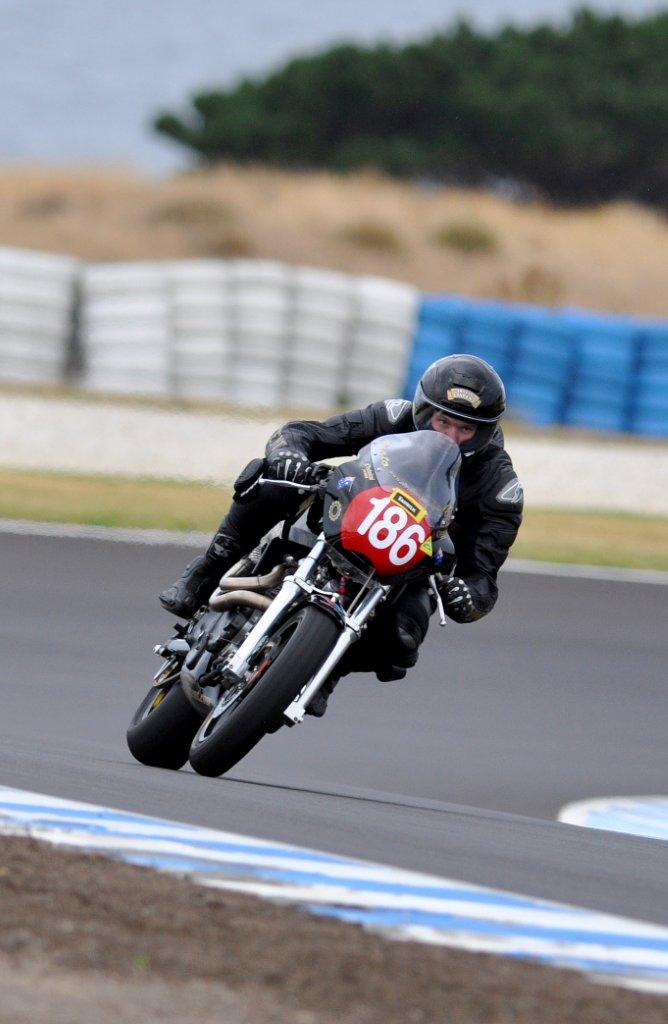Irving Vincent M.I.A. from Island Classic – By Trevor Hedge
Last week we received notification from Ken Horner that his stunning Irving Vincent will not be participating in the 2015 Island Classic.
A favourite amongst fans and racers alike, the bespoke machine that has been lauded all over the world from its birthplace at Hallam (VIC), to Goodwood, and of course its predecessors famous victory at Daytona has all underlined the global appeal of the stunning machine.
As is so often in motorcycle sport, rules and politics seem to be the root of most problems. The recent discussions have concerned changes to the current race machine that has seen the capacity enlarged to 1600cc.
Twin-cylinder machines are allowed a larger capacity in most race series around the world. In WSBK twins are allowed 1200cc, compared to the 1000cc of the four-cylinders, while in ASBK 2015 twins will be allowed an even bigger advantage, with Motorcycling Australia pushing the twin-cylinder limit up to 1300cc, giving twin-cylinder machinery a 300cc advantage over their four-cylinder competitors.
In classic racing the capacity ceiling for Period 5 machines, regardless of the number of cylinders, is 1300cc. Ken Horner had been lobbying for a 1600cc allowance so they could try and compete with the 1300cc four-cylinder machines on track.
With the Island Classic an International event overseas competitors were involved in the discussions to allow the larger capacity for v-twin machinery, MCNews.com.au believes this is where the proposal ran into troubled waters, with overseas competitors firmly against the move to up the capacity limit for v-twins in Period 5.
The 2015 Island Classic will be staged on the weekend of January 23-25, 2015.
Ken Horner made the following statement to MCNews.com.au
“After much communication and several meetings amongst all parties concerned, it has proved impossible to settle on a twin-cylinder engine parity regulation for MA’s Period 5 Post-Classic rules, similar to that prevailing in the FIM World Superbike, Australian Superbike and AMA Superbike championship series. This has resulted in twin-cylinder motorcycles like the Irving Vincent being excessively disadvantaged, to the point that any such bike is incapable of being competitive under current ruling.
“The Island Classic’s International Challenge is effectively now Classic Superbike racing, uniquely contested by four-cylinder machinery. The Irving Vincent has for some years been the only twin-cylinder motorcycle able to compete effectively against the four-cylinder machines, with no such entries from marques such as Ducati, BMW, Triumph, Moto Guzzi, etc. Now even we have decided that enough is enough, without any movement in the rules.
“A comparison of engine specifications between the Irving Vincent and its four-cylinder Period 5 rivals will confirm the inequity of the present regulations:
Irving Vincent: 1300 cc
- 50° Twin Cylinder, Air Cooled
- 2 Valves per Cylinder
- Push Rod valve gear
Honda, Suzuki etc. Fours: 1300 cc
- Inline 4 Cylinder, Air Cooled
- 4 Valves per Cylinder
- Twin Overhead Camshafts
“This fundamental imbalance between the two types of engine means it is not practical to compete against the 1300cc four-cylinder, four-valve machine with a 1300cc two-cylinder, two-valve pushrod engine. At the stage that we were competing against four-cylinder machines with two valves per cylinder, there was comparable performance. But at the stage that later four-cylinder four-valve engines were admitted – a unilateral decision taken without any comparable adjustment in the twin-cylinder rules – the present imbalance in the regulations took effect, which it seems impossible to correct.
“We had requested a two-cylinder 1600cc capacity limit to enable us to take part on something approaching a level playing field, but have been unable to obtain the consensus of all parties concerned to this proposal. As a result, the Irving Vincent team will no longer be taking part in Australian Period 5 competition, unless and until such an unjust imbalance in the regulations is addressed.
“We are aware that we will be disappointing our many supporters with this decision, as well as those who welcome the sight and sound of an Australian-built air-cooled V-twin competing against the four-cylinder Japanese machines. We very much regret that this will be the case, but bearing in mind the amount of time, effort and cost that is entailed in competing in these events, not to mention the extreme limits that our rider Beau Beaton must ride the bike at in order to keep up with the 30% more powerful four-cylinder bikes weighing almost the same, we do need this parity alignment in order to be able to run competitively in this form of racing. Without being able to settle on an engine parity ruling similar to that pertaining in National-level and World Superbike racing, we regret having to come to this difficult decision.”
MCNews.com.au also approached Fergus Cameron, Managing Director of P.I. Operations for comment.
“As the promoter of the Island Classic I am very disappointed the Irving Vincent will not be making an appearance.
“For many years past the special rules pertaining to the International Challenge have been arrived at by unanimous agreement between the team captains.
“This has served us well in the past when there has been a need for compromise to manage the different rules governing eligibility in UK, USA, NZ and Australia.
“It is fair to say there has been various opinions expressed about the eligibility of the Irving Vincent at the increased capacity of 1600cc and unanimous compromise has proved difficult to achieve.
“Nevertheless the overriding view is the Irving Vincent can run at the same capacity as last year but it would not be accepted at the increased capacity.”

Ken Horner Engineering Video
[youtube id=”1c5TU3Dwodo” width=”853″ height=”480″]
Some Images of the Irving Vincent at the 2009 Island Classic























